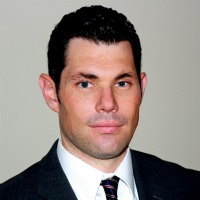By Casey Flaherty

Casey Flaherty
Controversy has a way of driving traffic. Thus, in advance of attending ReInvent Law NYC with Paul Lippe, Patrick Lamb and other rebellious luminaries, let me take an unprovoked jab at one of our fellow speakers, the esteemed Richard Susskind. Disagreeing with Richard Susskind is not something I do often or lightly. But I am comforted by the fact that the Susskind I am about to debate is merely a caricature, a vital but injudicious doomsayer who left the question mark off the end of the title to The End of Lawyers? The real Susskind is a deep, textured thinker.
You should read his books and come see him, Paul, Patrick, and others in New York on Feb. 7. Subtlety, nuance, and fair-mindedness, however, make debate far too civil. So let me knock down the Susskindian strawman for his excessive commitment to the constricting idea that there are only two types of legal work, bespoke and commoditized.
Bespoke legal work is what “real” lawyers do. It is the careful crafting of precise, novel arguments; the construction of perfectly calibrated contracts to envelop the world’s most important transactions; the virtuoso courtroom performance needed to emerge victorious in a bet-the-company litigation. Commoditized legal work is for drones. It is rote. It can be handled by young lawyers who didn’t get a “real” legal job, or foreigners (legal process outsourcing), or, more and more, computers. Where the bespoke lawyer is an artisan, the commodity lawyer is a fungible factory worker.
Fake Susskind tells anyone who will listen that commoditization has not gone far enough; that we are stuck in Old World ways of treating every legal issue like a precious snowflake when we should get on with it and embrace a New Normal in which we can use technology/outsourcing to leverage the skills of the 14 or so genuinely good lawyers (Patrick, Mark Herrmann, David Boies, etc.) to satisfy all the demand for legal services.
Despite the hyperbole, there is something to the above. But that something gets obscured in the vitriolic debates about what legal work can and cannot be commoditized. Civilized discussion becomes unlikely once you tell a well-educated, well-compensated, well-respected professional that your thesis is that they and their similarly situated colleagues can be replaced by a motherboard and some paralegals based in the Philippines. Understandably, these incumbent stakeholders get defensive and fall back on bulwarks that have served them well: precedent (things should be as they have been) and distinguishing (what you say may has some merit in a different context but does not apply to me).
Because I think it is an essential debate, I would like to rip off Paul’s latest column and offer an alternative framing. Rather than focusing verbiage on the end result of commoditization, I think proponents of Legal by Design should instead dedicate more effort to praising the system builders. These are the talented, seasoned professionals whose expertise makes commoditization possible. Document assembly can commoditize contract-generation only because of the stellar work by some genius lawyer on the underlying template. The outsourced paralegal is only capable of QCing the contract because of the exquisite checklist that embodies the sagacity of many heroic professionals. The contract can only be executed and stored electronically because of the comprehensive, attorney-designed workflow. I know many lawyers whose knee-jerk disgust with commoditization does not preclude their quick agreement that the legal profession—nay the world at large—would be better off if we could somehow absorb and disseminate the lawyer’s deep wisdom. Telling Lawyer X that system building is primarily about asking ourselves: “What would Lawyer X do?” is probably a more compelling sales pitch than “Lawyer X is obsolete.” (Just don’t let them read this).
I’ve now written 500 words without saying much, if anything, about reality. I am having a fictional debate with a phantom Richard Susskind over a descriptor. I still subscribe to the notion that “in the industrial economy, the person who wins is the expert. In the knowledge economy, the person who wins is the one who has the process to solve complex problems.” But it serves the cause to give just due to the experts who are instrumental in designing these processes. Though not as influential as incentives and structural forces, framing matters.
Thus, as we emphasize the importance of Legal by Design, let us invite the 50 percent—still in denial or unsure on how to embrace change—to share their vital insights by translating their esoteric brilliance into systems. Let us celebrate the role of our system builders; may they never be replaced by string of binary code.
D. Casey Flaherty is corporate counsel at Kia Motors America, Inc. where he oversees dealer-related legal matters and electronic discovery. Casey regularly writes and speaks about the audit, electronic discovery, budgeting, and other topics at the intersection of law and technology. His LegalTech West keynote on the audit can be viewed for free here. The opinions he expresses are his own and not those of Kia Motors America, Inc.
Editor’s note: The New Normal is an ongoing discussion between Paul Lippe, the CEO of Legal OnRamp, Patrick Lamb, founding member of Valorem Law Group and their guests. New Normal contributors spend a lot of time thinking, writing and speaking about the changes occurring in the delivery of legal services. You’re invited to join their discussion.